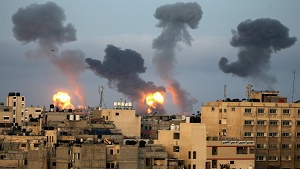Ban’s appeal comes as the extraordinary summit meeting of Heads of State of the Economic Community of Central African States, took place in the Gabonese capital, Libreville, on Wednesday.
The summit was expected to reinforce efforts undertaken by the CAR government, under President Faustin-Archange Touadéra, to consolidate peace and place the country on a path to recovery and stability, according to a UN press release.
Expressing deep concerns over last week’s renewed violence in the CAR that reportedly claimed dozens of lives and displaced more than 11 000 persons, Ki-moon called on the armed groups to immediately and to “genuinely” commit to peace.
He further appealed to the armed groups to address the root causes of the conflict including through the implementation of the disarmament, demobilisation and reintegration programme recently approved in Bangui.
The Secretary-General underlined the willingness of the international community to support the CAR towards recovery and stability, as expressed at the recent Brussels conference on the country. “For this to happen it is important that the right circumstances prevail,” he said.
Two factions of the ex-Séléka armed group, the Front populaire pour la renaissance de la Centrafrique (FPRC) and the Union pour la paix en Centrafrique (UPC) clashed in Bria, Haute Kotto prefecture and many of the victims were reportedly civilians. The country’s current borders were established by France, which ruled the country as a colony starting in the late 19th century.
After gaining independence from France in 1960, the CAR was ruled by a series of autocratic leaders; by the 1990s, calls for democracy led to the first multi-party democratic elections in 1993. Ange-Félix Patassé became president, but was later removed by General François Bozizé in the 2003 coup.
The Bush War began in 2004 and, despite a peace treaty in 2007 and another in 2011, fighting broke out between various factions in December 2012, leading to ethnic and religious cleansing of the Muslim minority and massive population displacement in 2013 and 2014.
--ANA--
Please visit our Poll section on the website and take part, have your say as our valued reader.












